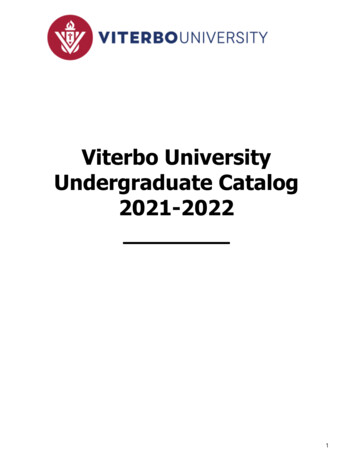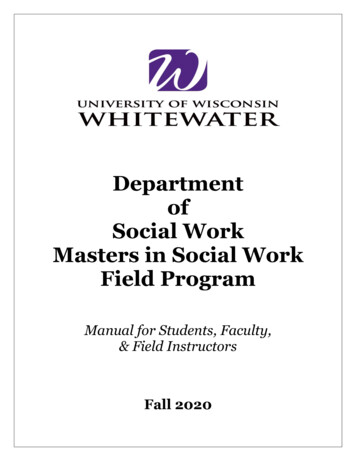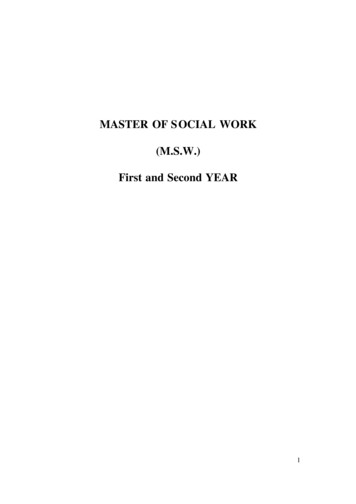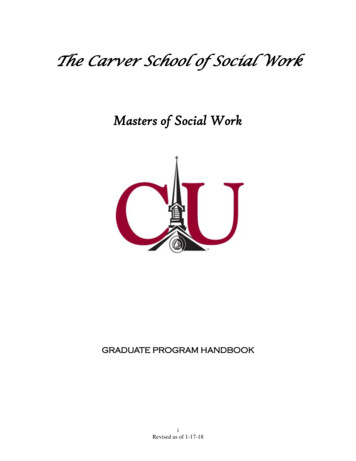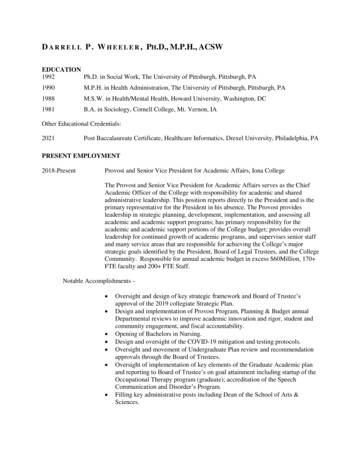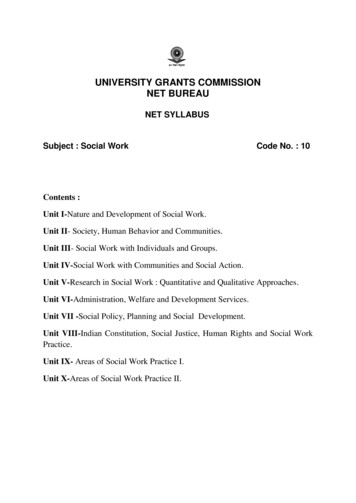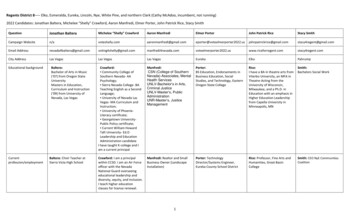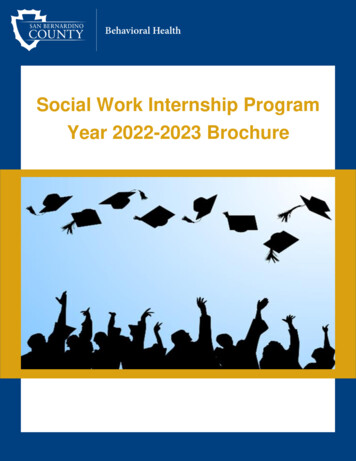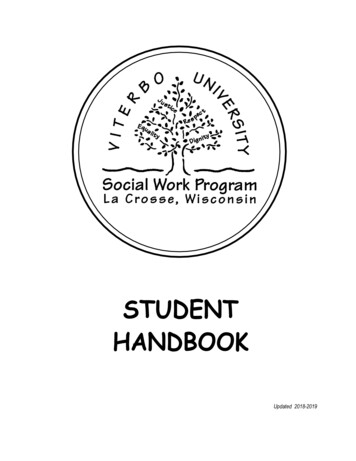
Transcription
STUDENTHANDBOOKUpdated 2018-2019
Table of ContentsSection One:IntroductionWelcome . 1Professional Opportunities in Social Work. 1Graduate Education in Social Work . 3Section Two: Overview of Viterbo University Social Work ProgramSocial Work Program Accreditation . . 3Mission of the Social Work Program. . 4Social Work Program Goals . . 4Definition of Generalist Social Work Practice . . 4Section Three: AdmissionAdvancement in the Social Work Program . 5Admission to the Professional Social Work Program . 5Admission Requirements for the Social Work Professional Program . 5Criteria for Reviewing Application for Admission . 6Response to Student Applications . . 6Conditional Admission . 6Transfer Students . 6Associate of Arts/Science Bridge Students . 7Credit for Life Experience . 7Readmission to the Social Work Program. . 7Section Four: CurriculumSocial Work Curriculum . 8Social Work Electives .11Four Year Schedule for Social Work Major: Bachelor of Arts Degree .13Four Year Schedule for Social Work Major: Bachelor of Science Degree .14Part-Time Students .15Field Education Program .16Minors and Study Abroad .16Section Five:Student Rights and ResponsibilitiesStatement of Student Rights .17Class Attendance . 17Course Expectations . 17Student Contact Information .17Student Educational Files .17Reporting of Child Abuse and Neglect .18Social Work Major with a Criminal Background.19Student Professional Development, Retention and Termination Policy . 21Student Academic and Professional Standards . 23Appeal Process . 26Procedure for Readmission Following Dismissal .27Readmission Process . 27Non-Discrimination Statement . 28Sexual Harassment . 28Americans with Disabilities Act (ADA) . 28Student Support Services (TRIO) .28Caregiver Background and Criminal History Check . .28Section Six:Student Related ServicesAdvisement . 29Student Social Work Club. 30National Association of Social Workers . 30Section Seven: Student Participation on Program CommitteesViterbo University Social Work Program Advisory Council . 31Student Input to Program Policies .31Section Eight: NASW Code of Ethics and CSWE Educational Policy and Accreditation StandardsNational Association of Social Workers Code of Ethics .32CSWE Educational Policies and Accreditation Standards .46
SECTION ONE: INTRODUCTIONWELCOMEWelcome to the Viterbo University Social Work Program. You have chosen a dynamic and challengingprofession to prepare for. This handbook has been written to familiarize you with the Social Work Programat Viterbo University. We hope that it will answer some of your bigger questions. Please call or visit with theprogram faculty for further information. The Social Work Program faculty offices are located in the NursingCenter.Social Work Program Faculty and StaffJennifer Anderson-MegerProgram DirectorProfessorNursing Center 409796-3722jimeger@viterbo.eduDeb Daehn-ZellmerProfessorNursing Center 107796-3728ddzellmer@viterbo.eduJanet HolterField Education DirectorAssistant ProfessorNursing Center 410796-3724jholter@viterbo.eduJayne OliverProgram AssistantNursing Center 107796-3670jaoliver@viterbo.eduPROFESSIONAL OPPORTUNITIES IN SOCIAL WORKSocial work is recognized as one profession that is expected to expand greatly in the next decade. There area variety of reasons for this projection. First of all there are a growing number of challenges facing society inthe U.S. and globally such as immigration and refugee issues, outsourcing of work, poverty, hunger,HIV/AIDS and crises such as hurricanes and tsunamis. Locally we are faced with issues of child abuse andneglect, individuals in need of health care without insurance, individuals dealing with chronic mental illnessand addictions, veterans returning from war and dealing with PTSD and homelessness. There is increasingrecognition that professional social workers are well prepared to address these challenges. Also with thesignificant growth in our aging population, there will be an increase in need for social workers to helpsenior’s live independent and satisfying lives. Employment opportunities will expand in social work with theelderly but also in other areas of social work practice as the need for social workers outpaces the supply.Finally, as in other professions, the current workforce of professional social workers is aging and as babyboomers retire, employment opportunities will be created for new social workers. The Bureau of LaborStatistics Occupational Outlook Handbook provides excellent employment projection information for socialwork:http://www.bls.gov/ooh/home.htm vice/social-workers.htmSocial workers with degrees from accredited social work programs are prepared to work in a wide variety ofsettings. Our graduates are now working in a broad range of private and public social service agencies. Areaswithin social work that are growing especially rapidly include child welfare, elder services, social work withinthe area of criminal justice and work with individuals who experience chronic mental illness. Your seniorfield education experience will be very helpful to you in making decisions about where you wish to beginyour professional work.1
The following are examples of jobs our recent graduates have obtained upon completion of their social work major.EmployerPositionHouston County Human Services, Caledonia, MNLutheran Social Services, La Crosse, WIWisconsin Cares, La Crosse, WIIndependent Living Resources, La Crosse, WISocial Worker, Children’s Mental HealthTreatment Foster Care, Youth WesternSocial Worker, Elderly and DisabledIndependent Living Specialist, DisabilitiesBenefit SpecialistSocial Worker, Elderly and DisabledCrisis Advocate, Domestic ViolenceChildren’s AdvocateCrisis Counselor, Adult Mental HealthSocial Worker, ElderlySocial Work Case ManagerSocial Worker, ElderlySocial Worker-Crisis CounselorCPS-Initial Assessment Social WorkerJustice Support-Jail Social WorkerJustice Support- Bond and Sentencing WorkerPermanency Unit- Social WorkerSocial worker, ElderlyAODA CoordinatorSocial Worker, ElderlyHospice, Volunteer/Community OutreachCPS, Initial Assessment Social WorkerSocial Worker, Family ServicesSocial Worker, Adult Mental HealthSocial Worker, Juvenile JusticeFamily Advocacy TrainerRehabilitation Social WorkerCPS & Kinship Care CoordinatorSocial Worker, Juvenile DelinquencyMedical Social Worker- Emergency RoomMedical Social Worker-OB Clinic, PostpartumHospice and Home Health Social WorkerSocial Worker, Discharge PlannerEmergency Services Social WorkerAdoption Social WorkerDirector of Social ServicesSocial WorkerGuardian ad Litem Case CoordinatorMedical Social Worker, OncologyGerard Hall, Family ServiceSienna Hall, Adult Mental HealthCase Manager, Adult Mental HealthCPS, Initial Assessment Social WorkerSocial Worker, ElderlySocial WorkerSocial Worker, ElderlyPatient and Family ServicesBirth to Three Service CoordinatorMulder Health Care Facility, West Salem, WINew Horizons Shelter & Outreach, La Crosse, WILa Crosse County CARE Center, La Crosse, WITomah Health & Rehabilitation Center, Tomah, WISouthwest Family Care Alliance, Prairie du Chien, WISagen Center-St. Joseph’s Rehabilitation Center, La Crosse, WIFamily Services of Northeast WI, Sheboygan, WILa Crosse County Human Services, La Crosse, WIGolden Living Care Facility, La Crescent, MNTrempealeau County Health Care Center, Whitehall, WIMorrow Memorial Homes & Apartments, Sparta, WIMinistry Health Care, Wausau, WIMonroe County Human Services, Sparta, WIArmy Community Services, GermanySt. Mary’s Care Center, Madison, WIVernon County Human Services, Viroqua, WIIowa County Human Services, Dodgeville, IAGundersen Health System, La Crosse, WILutheran Life Communities, Arlington Heights, ILCatholic Charities, La CrosseHeritage Manor Nursing Home, Elroy, WIJackson County Human Services, Black River Falls, WILegal Aid Society of Orange County, Orlando, FLMayo Clinic Health System, La Crosse, WICenter for Independence, Milwaukee, WIBureau of Milwaukee County, Milwaukee, WIBethany Riverside Nursing Home, La Crosse, WIJackson County Department of Correction, Black River Falls, WIHopkins Care Center, Hopkins, MNVernon Memorial Healthcare, Viroqua, WIParenting Place, La Crosse, WI2
GRADUATE EDUCATION IN SOCIAL WORKMost of our graduates decide to work in the profession upon graduation to gain valuable experience.However, several of our graduates have gone right on to graduate school immediately and report that theyfeel very prepared for graduate school. There are many universities that offer Master of Social Work (MSW)degrees throughout the country. Viterbo University does not offer an MSW program, but may be exploringoptions in the future. The Council on Social Work Education lists all accredited social work programs ontheir website at www.cswe.org and you can search for programs by state and other criteria.The following is a list of schools that offer MSW programs in the region:Wisconsin:- University of Wisconsin-Green Bay and Oshkosh- University of Wisconsin-Madison- University of Wisconsin-Milwaukee- University of Wisconsin-OshkoshMinnesota:- Augsburg College- Capella University- College of Saint Scholastica- Minnesota State University-Mankato- St. Catherine University/University of Saint Thomas CollaborativeIowa:- Clark University- St. Ambrose University- Loyola University at the Carthage College campus- George Williams College of Aurora University atWilliams Bay-St. Cloud State UniversityUniversity of Minnesota-DuluthUniversity of Minnesota-Twin CitiesWalden University- University of Iowa- University of Northern IowaMany Master of Social Work (MSW) programs grant advanced standing to applicants with a Baccalaureatedegree in social work from an accredited program allowing them to complete an MSW in a shortened timeframe (in most cases one year as opposed to two).SECTION TWO: OVERVIEW OF THE VITERBO UNIVERSITY SOCIAL WORK PROGRAMSOCIAL WORK PROGRAM ACCREDITATION PROCESSWhat is Accreditation?Accreditation is a process that assures clients, employers, and graduates, that individuals with a major insocial work have graduated from a program that meets specific standards for quality social work education.The Council on Social Work Education (CSWE) is the agency that is authorized to accredit baccalaureate andmaster’s degree programs in social work education in the United States. Accredited Social Work EducationPrograms must demonstrate that they meet minimum standards set by CSWE for social work education. Abrief description of CSWE Accreditation Standards can be found in section 8 of this handbook, and acomplete description can be found online here.Why is Accreditation important?Accreditation is extremely important to students for several reasons. Most states require a degree in socialwork from an accredited program to be credentialed as a social worker. Certification or licensure as a socialworker is required for many jobs and it gives graduates a tremendous advantage in finding employment.Graduating from an accredited program also prepares one for entering a master’s degree program in socialwork. Many Master of Social Work (MSW) programs grant advanced standing to applicants with aBaccalaureate degree in social work from an accredited program allowing them to complete an MSW inshortened time frame (in most cases one year as opposed to two).What is the Accreditation status of the Viterbo University Social Work Program?The Viterbo University Social Work Program has been continuously accredited since 2000. The program isfully accredited until October 2021 when we will be reviewed for continued accreditation.3
MISSION OF THE SOCIAL WORK PROGRAMViterbo University Social Work Program Mission StatementThe mission of the Viterbo University Social Work Program is to prepare baccalaureate students for entrylevel generalist social work practice. In an atmosphere of integrity and respect, students will developprofessional knowledge, values, and skills for service provision and social change. The program is guided bythe Franciscan values of human dignity, social justice, strengths of diverse populations, and respect fordisenfranchised members of our global society.Program Goals (linked to CSWE 2015 Social Work Competencies):1. Prepare students for beginning generalist social work practice with individuals, families, groups,organizations and communities. (Competency 6, 7, 8, 9)2. Prepare students for social work practice with diverse populations and cultures. (Competency 2)3. Prepare student in the use of social work research to inform and evaluate practice. (Competency 4, 9)4. Prepare students for development of a professional identity consistent with social work values andethics. (Competency 1)5. Prepare students to promote social and economic justice for disenfranchised groups through socialchange and advocacy. (Competency 3, 5)DEFINITION OF GENERALIST SOCIAL WORK PRACTICEGeneralist practice is grounded in the liberal arts and the person-in-environment framework. To promotehuman and social well-being, generalist practitioners use a range of prevention and intervention methodsin their practice with diverse individuals, families, groups, organizations, and communities based onscientific inquiry and best practices. The generalist practitioner identifies with the social work professionand applies ethical principles and critical thinking in practice at the micro, mezzo, and macro levels.Generalist practitioners engage in diversity in their practice and advocate for human rights and social andeconomic justice. They recognize, support, and build on the strengths and resiliency of all human beings.They engage in research-informed practice and are proactive in responding to the impact of context onprofessional practice.The baccalaureate program in social work prepares students for generalist practice. The descriptions ofthe nine Social Work Competencies presented in the EPAS identify the knowledge, values, skills, cognitiveand affective processes, and behaviors associated with competence at the generalist level of practice.(Educational Policy, CSWE, 2015)4
SECTION THREE: ADMISSIONADVANCEMENT IN THE SOCIAL WORK PROGRAMProfessional advancement in the Social Work Program involves a three step process:Step 1: Declare a social work major and be assigned a social work faculty advisor.Step 2: Apply to the Professional Phase of the Social Work Program upon completion of pre-requisiterequirements. Complete and submit the online forms located on the Social Work Programwebpages. Professional Phase admission typically occurs in the spring semester of thesophomore year. Transfer students can enter the social work major at any time but must alsoformally apply for the Professional Phase.Step 3: Prior to entering field education students complete the Application for Acceptance to SocialWork Field Education Program. Deadline for application to Field Education is early in August ofthe senior year. The Field Director will inform you of the process.ADMISSION TO THE PROFESSIONAL SOCIAL WORK PROGRAMThe professional social work sequence of courses begins at the junior level. Students apply to theprofessional phase of the Program by completing a formal application for admission typically in the spring oftheir sophomore year. The application is due February 1st for current students at Viterbo for admission to theprofessional phase courses (junior level) for the following fall. Only applications from change of major ortransfer students will be accepted after February 1st. The application is available online. Professional phasecourses are sequential and students can only begin these courses in the fall semester.ADMISSION PROCESS: Complete and submit the online Application for Admission on the Social Work Web Page. Academic Writing Sample and Personal Essay uploaded with the application. Interview required at the discretion of the admissions committee.ADMISSION REQUIREMENTS FOR THE SOCIAL WORK PROFESSIONAL PROGRAM1.2.3.4.5.Admission to Viterbo University.Completion of 30 semester hours prior to admission to the Social Work Program.Cumulative GPA 2.5/4.0 at the time of application.Grade of B or better in SOWK 210—Introduction to Social Work (This course maybe repeated once.)Completion of the following prerequisite courses with grades of C or better. These courses may be inprogress at time of application. Transfer students may have taken the equivalent of these courses attheir prior college. If you have questions regarding transfer credits please contact the Social WorkProgram 104:*125:121:203:171:210:240: **275:Composition and the Elements of ArgumentComposition and LiteratureIntroduction to SociologyIntroduction to American GovernmentHuman Biology for Social ServicesGeneral PsychologyIntroduction to Social Work (must earn B or better)Introduction to Research Process and Analytical WritingIntroduction to Professional Practice*ENGL 105 or 195 can be substituted for 103 & 104**SOWK 240 is only available at Viterbo. Transfer students will take this course after their transfer.6.Effective written and oral communication.5
A student who does not meet one or more of the above requirements at the time of application, may beconsidered for conditional admission to the Social Work Program by submitting a written plan.CRITERIA FOR REVIEWING APPLICATION FOR ADMISSIONApproval for admission to the Viterbo University Social Work Program is based upon an assessment by theAdmissions Committee, made up of the social work faculty, using the criteria listed below. Meetingminimum standards does not guarantee admission to the Social Work Program. Social work is aprofessional program thus numerous factors are taken into account including an applicant’s capacity toacquire the requisite knowledge, values, skills and professional conduct of the profession of social work.Students are evaluated based on prior course work, admissions essay, volunteer evaluations, and otherinformation presented by social work faculty members. Factors included in the admission assessment are: class attendance and academic performance participation in classroom activities ability to meet deadlines ethical conduct ability to maintain positive relationships with faculty and other students as well as clients andsupervisors in volunteer placements evidence of willingness to be open to new ideas and beginning ability to examine one’s own values andbiases as they relate to social work practice ability to communicate effectively both in written and oral form maintenance of at least one year in recovery if student has history of chemical dependency assubstantiated in writing by an objective professional such as a physician or therapist reasonable emotional stability and maturity criminal record which would indicate a history of physical violence, sexual misconduct, or any otheroffense which would prohibit employment as a social work professional.RESPONSE TO STUDENT APPLICATIONS1. Full admission into the Social Work Program.2. Conditional admission into the Social Work Program with specific requirements and deadline forremoval of conditions.3. Not admitted into the Social Work Program with specific reasons for the denial listed.4. Decision deferred for further consideration by the social work faculty. (The student may be given theopportunity to supplement admissions materials.)Once a decision has been reached, the student will be notified in writing, and reasons or conditions areidentified. A student may appeal a denial of admission by following the Appeal Process for the Social WorkProgram.CONDITIONAL ADMISSIONIf a student is admitted to the Social Work Program on conditions, written notification is given to thestudent stipulating the conditions for admission. Conditions may include completing prerequisite courses,tutoring, raising GPA, taking a specific course, providing a student driven plan to address academic concerns,developing writing skills, or a variety of other measures.Students admitted under conditions are reviewed by the social work faculty at the end of each semester todetermine whether they have fulfilled their conditions and should be moved to good standing, or should continueon conditional status under a revised plan.No student on conditional status will be admitted into Social Work Field Education without special permission.TRANSFER STUDENTSThe Social Work Program makes provision for transfer of credits for coursework. The purpose of transfercredit review is to provide the opportunity for transfer students to demonstrate required course knowledgeand competencies to prevent the repeat of courses with similar content. A two-step process is employed to6
evaluate transfer of credit. The Viterbo University Registrar’s Office evaluates the transfer of earned creditfrom other institutions to Viterbo University and makes a determination regarding fulfillment of Universityand General Education requirements. This evaluation is forwarded to the Social Work Program. The SocialWork Program Director, in consultation with social work faculty, evaluates transfer credit for prerequisite,support and social work foundation courses. Students may be asked to provide a course syllabus as well asassignments completed in the course for review. Course equivalency will be determined based on a review oflearning outcomes, content outline, textbooks and readings, learning activities, instructor credentials, andtheoretical perspectives.A transfer student requesting admission and transfer credit may be asked to complete a Social Workadmission interview. A student accepted into Viterbo University as a transfer student that has been refusedadmission or dismissed by another social work program, will be asked to sign a release of information allowingthe Viterbo Social Work Program to communicate with faculty at the previous social work program.Viterbo University does not offer proficiency exams for any social work courses.ASSOCIATE OF ARTS / SCIENCE BRIDGE-STUDENTSBelow are the Policies and Procedures for Associate of Arts/Science students who bridge into a ViterboUniversity Bachelor’s degree program:1. All graduating AA/AS students must complete an “Application for Degree” form upon registration for thesemester in which they will complete their requirements, regardless of whether or not the studentintends to participate in commencement ceremonies. The deadline to complete this form is September15, for December graduation and January 15, for May or summer graduation. This form provides Viterbowith information to order a cap and gown, send ceremony information, place the student’s name on thegraduation list, order a diploma and post the degree.2. Students should complete an “Associate Degree to Bachelor Degree Transition Application” (no feerequired) and forward the completed form to Lisa Konkel, Academic Advising Coordinator.3. The “Associate Degree to Bachelor Degree Transition Application” will be forwarded to the Office of theRegistrar and a new “program” (major) will be assigned in the Ellucian/Datatel system, along with anew advisor.4. The Registrar’s office will forward the “Associate Degree to Bachelor Degree Transition Application” toTerry Norman, Director of Financial Aid, who will make any aid adjustment and award the student amerit scholarship, if the student qualifies. The merit scholarship will be based on existing scholarshipgrids and the student’s GPA. The student will NOT need to participate in Exit Loan Counseling as longas the Financial Aid office is notified in a timely manner of the student’s intention of continuing in abachelor’s degree program5. Lisa Konkel, Academic
- University of Wisconsin-Green Bay and Oshkosh - Loyola University at the Carthage College campus - University of Wisconsin-Madison - George Williams College of Aurora University at . Certification or licensure as a social worker is required for many jobs and it gives graduates a tremendous advantage in finding employment.
